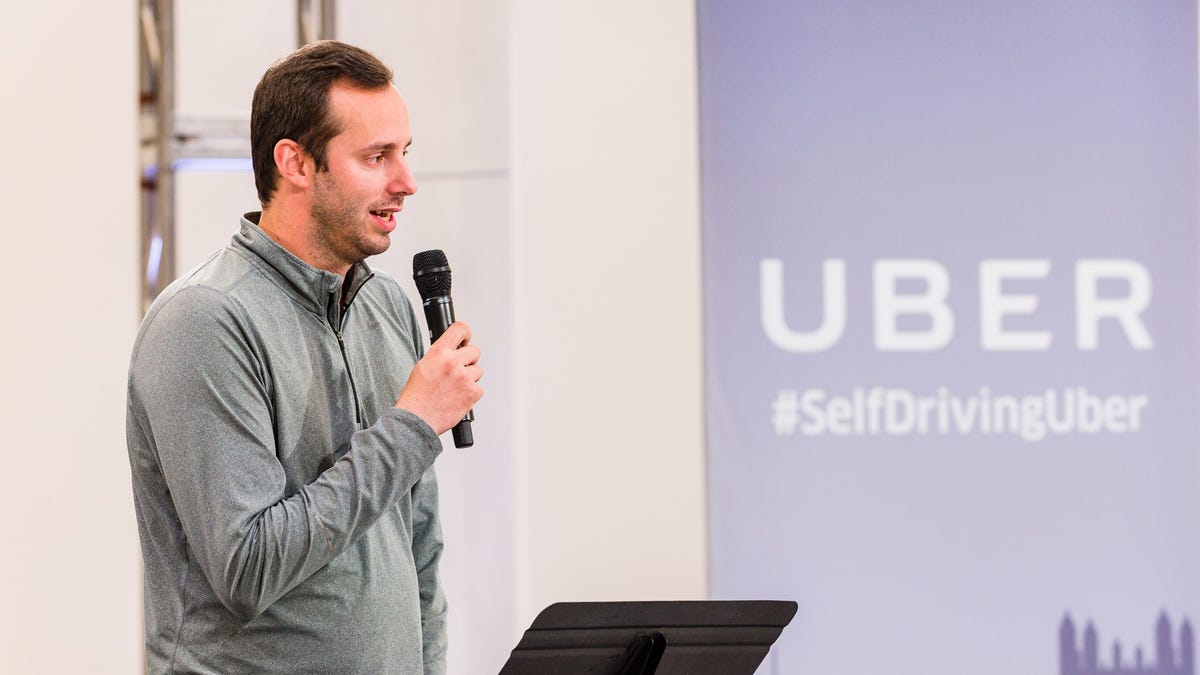Former Google engineer charged with theft of trade secrets
Anthony Levandowski left Google to develop Uber's self-driving car operation, spurring a bitter court battle between the tech giants two years ago.

Anthony Levandowski was at the center of the clash between Waymo and Uber.
Former Google engineer Anthony Levandowski was charged Tuesday with 33 counts of theft and attempted theft of trade secrets from the search giant, federal prosecutors said. The activities allegedly took place as he prepared to leave Google to build out Uber's self-driving car operation.
The alleged theft spurred a high-profile and bitter lawsuit two years ago between Google's self-driving car arm, which was renamed Waymo, and Uber. The charges are focused on Levandowski's work with Otto, a self-driving trucking company that the engineer founded and that Uber acquired in 2016. Google alleged that Levandowski downloaded 14,000 "highly confidential" files describing self-driving technology research and brought them to Otto.
Levandowski was indicted by a federal grand jury in San Jose, California. If convicted, he could face a maximum of 10 years in prison and a fine of $250,000 per charge, the Department of Justice said. Levandowski, wearing a suit and not handcuffed, appeared before US Magistrate Judge Nathanael M. Cousins in San Jose later Tuesday, according to NBC News. Through lawyers, he pleaded not guilty to all charges.
The announcement is the latest bombshell in the long-running legal drama between Waymo and Uber. The case, which went to trial in San Francisco last year, provided a rare glimpse into the high-stakes environment of big tech companies, which typically try to shield their inner workings from public view. But only days into the trial, which was expected to last at least three weeks, the two companies abruptly settled, giving Waymo 0.34 percent of Uber's equity.
"We have always believed competition should be fueled by innovation, and we appreciate the work of the US Attorney's Office and the FBI on this case," a Waymo spokeswoman said in a statement.
An Uber spokesman didn't specifically address the charges, but said in a statement, "We've cooperated with the government throughout their investigation and will continue to do so."
A star at Google
Levandowski is considered a pioneer of autonomous driving technology. In 2004, as a graduate student at UC Berkeley, he competed in the DARPA Grand Challenge for self-driving vehicles. He entered a driverless motorcycle named Ghostrider, which caught the attention of Google. In 2007, he was recruited by Google to become a key part of the search giant's self-driving car initiative, originally codenamed Project Chauffeur.
Levandowski left Google in 2016 to start Otto, which Uber quickly bought for $680 million.
The Justice Department's indictment alleges that Levandowski stole secrets related to lidar (for "light detection and ranging") technology. The tech allows self-driving cars to "see" their surroundings and detect traffic, pedestrians, bicyclists and other obstacles. The files downloaded by Levandowski allegedly included circuit board schematics, instructions for installing and testing lidar and an internal tracking document, the Justice Department said.
"All of us have the right to change jobs," US Attorney David L. Anderson said in a statement. "None of us has the right to fill our pockets on the way out the door. Theft is not innovation."
Miles Erlich and Ismail Ramsey, Levandowski's lawyers, disputed the claim that their client stole any secrets. "The downloads at issue occurred while Anthony was still working at Google -- when he and his team were authorized to use the information," they said in a statement. "None of the supposedly secret files ever went to Uber or to any other company."
Even after the settlement between Waymo and Uber last year, Levandowski continued to develop self-driving technology with a new startup called Pronto.ai. After the indictment on Tuesday, Pronto said Levandowski would no longer serve as CEO of the startup.
"The criminal charges filed against Anthony relate exclusively to Lidar and do not in any way involve Pronto's ground-breaking technology. Of course, we are fully supportive of Anthony and his family during this period," the company said.
Originally published Aug. 27 at 10:44 a.m. PT.
Update, 3:08 p.m. PT: Adds more background and details from Levandowski's arraignment.

